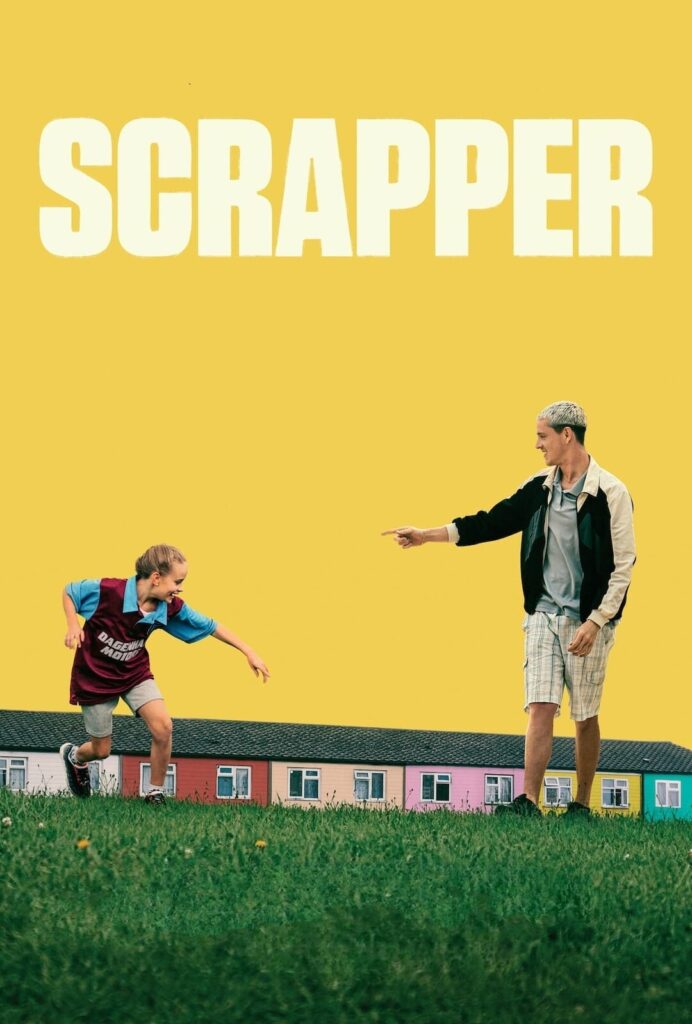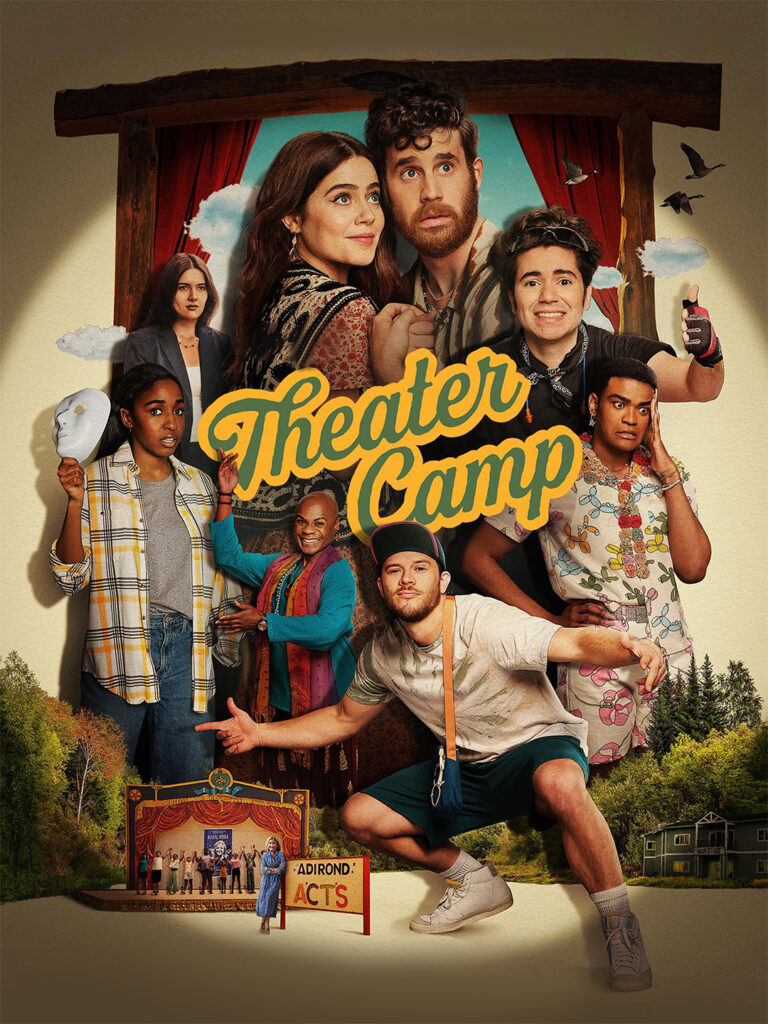My name is Dale Kearney, and, from today, I will be acting as the Film Editor for Post-Burnout!
I’m delighted to be aboard the editorial team for Post-Burnout. Over the past five years, I’ve dedicated my time to studying the art of film, from analysing all aspects of it and learning the ins and outs of filmmaking, which led me on to writing my own reviews. Diving into what makes a film good, and sadly, not so good. If I’m not reviewing or watching films, I’m writing scripts for side projects. Yet alongside film, I also do love music. Following the latest alternative rock acts and attending live gigs. If I’m not attending them, I’m attempting to cover their songs at home on guitar. Once again, thanks to Aaron Kavanagh for giving me a section to post essays and my reviews for the latest releases.
_________________________________________________
Scrapper

Coming out as a debut feature, we follow a British girl getting a chance to connect with her estranged, young (relatively speaking) father; who helps her through the struggles of growing up. This could be the brief synopsis for Scrapper or for last year’s, highly acclaimed, Aftersun.
This type of story isn’t wholly original but Scrapper takes the setting of a working class estate and turns it into the second parent for a growing girl. And much like Charlotte Wells’ first film, Scrapper comes from a deep place of love due to director Charlotte Regan at the helm. Taking custody of the film. The two directors just so happen to share their first name too. When we’re first introduced to Georgie, she’s tidying her house while making sure it aligns exactly the way her recently deceased mother used to have it. Fluffing up pillows and hovering the rooms. Using photos to make sure she’s as accurate as possible. Managing a household all on her lonesome. From the word start, Georgie is active and for the rest of the duration, we never stop being engaged in her character. Played astonishingly by first-time actor, Lola Campbell, who earns that introducing credit.
Her performance in this is nothing short of stunning. From her intonations in line delivery to her dominant, yet childish, demeanour on screen. She plays a tough girl in an adult world. When she gets caught stealing a bike, she comedically plays it off by pretending to be an inspector making sure the bike is road safe to the owner. But if she’s not the star of it, then it’d have to go to her on-screen father, Jason, played by Harris Dickinson, trading the influencer glam from Triangle of Sadness for a tracksuit jacket and cargo shorts. He teeters a fine line of whether we should like him or not, trust him or not, and care for him or not. These two are the heart and soul of this film, bouncing and playing off each other effortlessly.
Their chemistry shines through as they play a game in which they act as two strangers who are standing across the train platform from them. Although the two have never met before, they are cut from the same cloth. At a certain point, Jason tells Georgie to hand over her 1990s West Ham football jersey for the washing, which she is rarely spotted out of, because it stinks. It seems she’s got affinity from wearing the same clothes from her dad, as he’s also rarely spotted without his tracksuit jacket. Or if further proof is needed, I need only point towards how the pair seemingly know exactly how to nick bikes. Leading to a lovely father and daughter bonding moment of arguing about the best way to go about it. Although due to the necessity to look after herself, it doesn’t stop Georgie from embracing her childish demeanour.
Regan plays with this idea of childhood imagination quite well. Georgie and her friend make guesses as to what her father’s hidden history could be. Spinning the camera around to show a spotlight on Jason in the corner of the shop, dressed up as a vampire or mafia boss. Making the spiders in Georgie’s house characters through having them talk with NES-like dialogue bubbles popping up below them. These types of creative filmmaking feel tonally in-line with the film, unlike the cutaway, documentary interviews comprising of characters around the area who discuss Georgie and her behaviour. Regan uses these grand wide shots to make the main characters enveloped in the landscape around them. People feel much smaller in these shots compared to their surroundings. The towering flats in the background or an abandoned building set the stage for the characters’ world. It feels tangible and lively because of it.
The real catch-22 comes in the form of the runtime, which comes in at around the 84 minute mark. The fact that the writer/director has managed to tell this story in such a short amount of time is impressive. But to its detriment, there’s a lot left on the table here to be discovered. Jason’s background is left incomplete as opposed to ambiguous. We gets hints as to what it is but never really get a full picture to draw conclusions from. It’s a shame because these characters are so strong that you want to see more of them past the credits. Seems like they went with the approach of leaving them wanting more rather than overstaying their welcome.
Regan, who has made numerous music videos and short films before this, is clearly up on her stuff when it comes to what she is doing. Looking at greats before her like Ken Loach and using his compassion for the working-class and treating them with care and affection. A scene involving Georgie and Jason is akin to a short from Spike Jonze called How They Get There. Looking back on the past, it’s clear Regan is setting herself up for a promising future. And Scrapper is just the start of that.
Theater Camp

I can’t say that I’ve ever really been a theatre kid. When I was younger, there were people around me that were big into it, yet, I never participated. After watching Theater Camp, I’ve become extremely envious that I did not partake.
It welcomes anyone into its arms to embrace the scene that is theatre. And what a warm embrace it is. A directorial debut for both Molly Gordon and Nick Lieberman, the former starring in other comedies like Shiva Baby and Booksmart (while also starring in this.) Together, they concoct a movie that places you straight into the heart of a struggling camp. The film sets itself up as a documentary following the main players around the camp as they try and conjure together the shows that will be put on by the end of the camp. Bumbling tech bro, Troy (played by Jimmy Tatro), takes the reins of this camp, tasked with saving the camp from foreclosure through whatever schemes he can come up with after his mother falls into a coma. While that last bit sounds quite serious, I can’t stress enough how funny the circumstances around an event like that truly is. That’s the setup for it and over the next hour and a half, we’re treated with such fine payoffs.
The thing about comedies is that performances are king here. You can have great gags but if actors don’t have the magnetism on screen for comedy, they’ll fall flat on their face like something out of a Charlie Chaplin film. Except way less funny, so maybe a bad example. As mentioned before Jimmy Tatro plays this new-age media entrepreneur. As soon as I understood the character, I rolled my eyes thinking “Not another one of these.” Oh, how wrong I was. Even that cliché of an irritating vlogger is knee-slappingly funny. Same goes for Ben Platt and Molly Gordon as the two head teachers running their premium show. From the adults to the children, everyone here is utterly hilarious.
Another example could be Ayo Edebiri, a charlatan who works her way into the camp. This could be a one-note bit character, but is anything but that. Theater Camp doesn’t play for bits, it plays for roles. While watching it, you may also forget that it’s a mockumentary. Using their fly on the wall perspective with a grainy camcorder filter over the footage. Adding so much to the feel it wants to portray. But what makes you forget it’s a mockumentary, is that the crew filming it are never present. They don’t ask questions nor do the characters act differently when they’re around. It’s like a floating, invisible camera is following them around. Which is just… what a typical film is. It can feel pointless at times that they’ve used this approach, but without it, they can’t get the feeling that someone just pulled out their camcorder and started recording whatever mishaps were happening in the camp at that particular time. Giving the camera an important role of it being another camp member.
It’s clear that there’s a love for theatre here. Making fun of it in a way only someone who knows what they’re talking about can, while also embracing every possible aspect of it. Subsequently making the entire film endearing. I was belting out laughing, the most I’ve done in a cinema for a long time. When it came to the finale, it had to end strong to stick the landing of a great movie. And it sure did that. With the last performance, tears were welling up in my eyes with how emotional it all was. It wasn’t until it played off a joke in the midst of it all, that it pushed two tears to roll down each cheek of mine. Making you cry by making you laugh. Crying with laughter. That’s Theater Camp.

Dale Kearney is the Film Editor for Post-Burnout, and is a passionate film enthusiast, boasting multiple years studying and working within film, with an intrigue in all genres of film, from horror to comedies to musicals.

 POST-BURNOUT
POST-BURNOUT